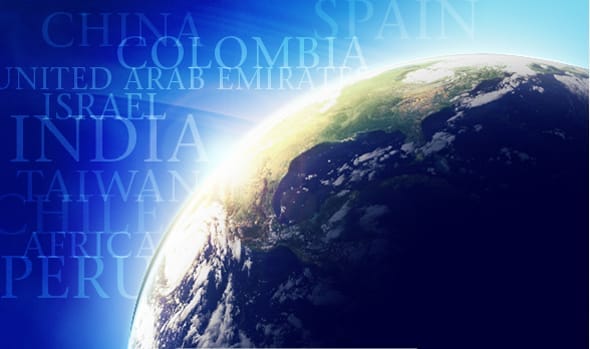Over winter break, five Wharton MBA students — Sushant Mukherjee, WG’09, James Hogarth, WG’09, Jennifer Akpapuna, WG’09, Kathy Park, WG’09, and Sachin Kaushik, WG’09—went to Kenya for their Global Consulting Practicum project and found themselves in the midst of the country’s dramatic post-election events. Sushant Mukherjee describes his team’s trip in the following article, which first appeared in the Wharton Journal.
The Wharton team had converged on Nairobi from locations as far-flung as Kathmandu, Minneapolis, London and New York, to begin work on our Global Consulting Practicum (GCP) project. Our clients were Philip and Katy Leakey, members of one of the most famous families in Kenya. Our task was to grow the U.S. sales of the Leakey Collection, thereby promoting its sustainability as a business and its ability to make an enduring impact on the lives of the Maasai people.
The Leakey Collection is a rural social enterprise employing more than 1,000 Maasai women who make stylish contemporary jewelry from drought-resistant grass beads. For the Maasai, the enterprise provides a valuable alternative source of income while allowing them to retain their traditional lifestyle. Philip and Katy Leakey have a longstanding association with the Maasai. Philip’s parents, Mary and Louis Leakey, are renowned archaeologists whose discoveries in the Olduvai Gorge of Tanzania were critical in establishing human evolutionary development in Africa. Their work brought them in close contact with the pastoralist Maasai people. As luck would have it, we arrived in Kenya on the evening of Election Day.
We had known about the elections, but hadn’t dwelt on potential dangers, based on Kenya’s reputation as a bastion of stability in an otherwise politically troubled region. Nonetheless, from the window of the taxi, the normally bustling city of Nairobi seemed unnaturally calm. The next day, with the election results still up in the air, we flew to Malindi on the Indian Ocean coast, and then made our way down the coast to the sleepy beach resort town of Watamu where the Leakeys had arranged for us to unwind prior to the business end of our trip.
As we drove up and down the potholed road looking for the right house, a lithe Maasai warrior loomed in front of us, holding a wooden club with a heavy knob at one end. He motioned us towards a rusty iron gate, beyond which a dirt trail led town to a thatch beach house, which was to be our home for the next five days. In Watamu, we spent our time soaking up the sun, swimming and snorkeling. But in the back of our minds, there was always unease about what was happening in other parts of the country. On New Year’s Eve, the chairman of the Electoral Commission announced that the incumbent, Mwai Kibaki, had narrowly won the election, and half an hour later he was sworn in for a second five-year term. That day, laid-back Watamu was galvanized into activity. When James Hogarth and I went to the local grocery store to stock up on supplies, the parking lot was overflowing with others who were preparing for the worst. Inside the store, we foraged for whatever supplies we could, while tense expatriates exchanged the latest rumors and warnings.
The next day, we departed for Malindi airport in the hope of catching flights back to Nairobi to finally meet with the Leakeys, only to be informed that the flight had been overbooked and we were unable to board. It was the beginning of an exhausting, interminable vigil at the airport. When we finally arrived in Nairobi, the Leakeys were waiting for us.
We squeezed the whole team into their vehicle and set off for their tented camp near the Tanzanian border, called Olkerii. On the way, as dusk fell, we entered the legendary Great Rift Valley, with its endless plains, punctuated by shimmering lakes and acacia trees, with thickly woven weaver nests hanging from the branches. The election riots seemed a world away. We stayed in the Leakey’s bush camp for the four days, talking with them at length about their ideas on rural enterprise and the future of their business.
We examined their production facilities, which included gas-fired kilns to make porcelain, and workshops for cutting the grass beads. We watched the Maasai women at work under the acacias, chatting animatedly as they strung beads onto elastic strands. We spent one memorable afternoon as guests at a Maasai barbecue, where a goat was slaughtered in our honor—even Sachin, a lifelong vegetarian, duly chewed on a small piece of meat to acknowledge their hospitality.
One moment during our stay at the Leakey camp remains particularly vivid. In the middle of an intense discussion on the difficulties of shipping products from Kenya to the U.S., James broke off in mid-sentence, and shouted, “Look — the volcano is erupting!”
Sure enough, across the valley,near the Tanzanian border, the volcano Lengai was spectacularly spewing smoke and ash. It was a magical moment, one that poignantly captured the natural beauty of our surroundings.
The next day, after exploring various departure options which included the possibility of being airlifted from Olkerii, we finally received word that it was safe to return to Nairobi by road, in time to catch our flights. We flew home from Nairobi the following morning.


























